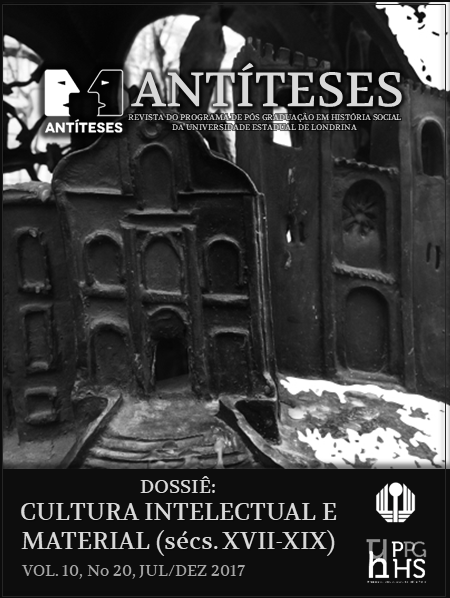An oitocentist utopia: equality, labor and state in a society imaginated by Edward Bellamy
DOI:
https://doi.org/10.5433/1984-3356.2017v10n20p919Keywords:
Utopist literature, Imaginary societies, Equality. BellamyAbstract
This article attempts to examine the utopian literature of the nineteenth century, approaching more directly, in more deeply, the imaginary society devised by Edward Bellamy, in the novel Looking Backward (1888). These more specific analyse is preceded by a brief introduction to utopian literature since the XVI century – recovering comparatively propositions of authors such as Thomas More, Campanella, Francis Bacon, Fourier, Saint-Simon, and Robert Owen – , besides a theoric discussion about the models of equality distribution, in this case considering the reflections of Norberto Bobbio and Amartya Sen on this topic. The novel of Bellamy is addressed in their historical context, and is justified because it concerns a bridge between literature and society, since this work has aroused great interest of readers of the time and even inspired a motivation for carrying out specific utopian experiments.Downloads
Download data is not yet available.
References
BACON, Francis. A Nova Atlântida. São Paulo: Abril Cultural, 1980. (Os Pensadores) Original de 1610.
BELLAMY, Edward. Daqui a cem anos: revendo o futuro. Rio de Janeiro: Record, 1960. Original de 1888.
BELLAMY, Edward. Equality. New York: D. Appleton & Company, 1898.
BELLAMY, Edward. What ‘Nationalism’ Means. The Eclectic Magazine of Foreign Literature (1844-1898). v.52, n.3, p.289-ss. Sep., 1890.
BOBBIO, Norberto. Teoria Geral da Política – a filosofia política e as lições dos clássicos. Rio de Janeiro: Campus, 2000. Original de 1999.
BOWMAN, Sylvia E. The Year 2000: a critical biography of Edward Bellamy. New York: Bookman Associates, 1958.
BUONARROTI, Philippe. Babeuf ’s conspiracy for equality. London: Hetherington, 1836.
CABET, Etienne. Voyage on Icarie. Paris: Au Bureau du Populaire, 1842.
CAMPANELLA, T. Cidade do Sol. São Paulo: Abril Cultural, 1980. Original de 1602. (Os Pensadores).
CIORANESCU, Alexandre. L’avenir du passe – utopie et littérature. Paris: Gallimard, 1972.
DESROCHE, H. Saint-Simon. Le nouveau christianisme et les Écrits sur la religion. Paris: Seuil, 1969.
FIRPO, Luigi. Por uma definição da “Utopia”. Tradução de Carfos Eduardo o. Berriel. Morus: Utopia e Renascimento, Campinas, n. 2, p.227-237, 2005.
FRANKLIN, John Hope. Edward Bellamy and the Nationalist Movement. The New England Quarterly, Boston, v. 11, p.739-772, dec., 1938.
FROMM, Erich. Prologue. In: BELLAMY, E. Looking Backward 2000-1887. New York: Signet, 1960.
FUNKE, Hans Gunter. L’évolution semantique de La notion d’Utopie en français” In: HUDDE, Heinrich; KUON, Peter (Eds.). De l’utopie a l’uchronie. Tubingen: G Narr, 1988. p. 19-37.
JACOBY, Russell. Imagem Imperfeita: Pensamento Utópico para uma Época Antiutópica. Rio de Janeiro: Civilização Brasileira, 2007.
LEVITAS, Ruth. The Concept of Utopia. Syracuse: Syracuse University Press, 1990.
MORRIS, Williams. Notes from Nowhere. New York: Oxford University Press, 2003. Original de 1890.
MORUS, Thomas. Utopia. São Paulo: Abril Cultural, 1980. Original de 1516. (Os Pensadores).
MUSSO, Pierre. Saint Simon et les saint-simoniisme. Paris: PUF, 1999.
NEUSÜSS, A (Ed.). Utopia. Barcelona: Barral, 1971.
ORWELL, George. 1984. São Paulo: Companhia das Letras, 2000.
PETRE-GRENOUILLEAU, Olivier. Saint-Simon, l’utopie ou la raison en actes. Paris: Payot, 2001.
PLATÃO. A República. Lisboa: Fundação Calouste Gulbenkian, 1993. Original: cerca de 380 a.C.
QUARTA, Cosimo. Utopia: gênese de uma palavra-chave. Morus: Utopia e Renascimento, Campinas, n. 3, p.35-53, 2006.
RACAULT, Jean-Michel. Da ideia de perfeição como elemento definidor da utopia: as utopias clássicas e a natureza humana. Morus: Utopia e Renascimento, Campinas, n. 6, p.29-45, 2009.
REYNOLDS, Mack. Looking Backward from the Year 2000. New York: Ace Books, 1974.
SADLER, Elizabeth. One Book’s Influence: Edward Bellamy’s Looking Backward. The New England Quarterly, Boston, v. 17, p.530–555, dec., 1944.
SAINT-SIMON, C-H. New Christianity.Original de 1825. Disponível em: http://la.utexas.edu/users/hcleaver/368/368StSimon6NewChristianity.pdf. Acesso em: 10 set. 2016.
SAINT-SIMON, Claude Henri de Rouvroy. Letres d’un habitant de Genève à ses contemporains. Paris: Alcan, 1925. Original de 1803.
SEN, Amartya K. Desigualdade reexaminada. Rio de Janeiro: Record, 2001. Original de 1992.
SUVIN, Darko. Pour une définition de l’utopie comme genre littéraire. In: SUVIN, Darko. Pour une poétique de la science-fiction. Études en theorie et en histoire d’un genre littéraire. Montréal: Les Presses de l’Université du Quebec, 1977. p.47-69.
WELLS, H. G. A Máquina do Tempo. Rio de Janeiro: Francisco Alves, 1983. Original de 1895.
BELLAMY, Edward. Daqui a cem anos: revendo o futuro. Rio de Janeiro: Record, 1960. Original de 1888.
BELLAMY, Edward. Equality. New York: D. Appleton & Company, 1898.
BELLAMY, Edward. What ‘Nationalism’ Means. The Eclectic Magazine of Foreign Literature (1844-1898). v.52, n.3, p.289-ss. Sep., 1890.
BOBBIO, Norberto. Teoria Geral da Política – a filosofia política e as lições dos clássicos. Rio de Janeiro: Campus, 2000. Original de 1999.
BOWMAN, Sylvia E. The Year 2000: a critical biography of Edward Bellamy. New York: Bookman Associates, 1958.
BUONARROTI, Philippe. Babeuf ’s conspiracy for equality. London: Hetherington, 1836.
CABET, Etienne. Voyage on Icarie. Paris: Au Bureau du Populaire, 1842.
CAMPANELLA, T. Cidade do Sol. São Paulo: Abril Cultural, 1980. Original de 1602. (Os Pensadores).
CIORANESCU, Alexandre. L’avenir du passe – utopie et littérature. Paris: Gallimard, 1972.
DESROCHE, H. Saint-Simon. Le nouveau christianisme et les Écrits sur la religion. Paris: Seuil, 1969.
FIRPO, Luigi. Por uma definição da “Utopia”. Tradução de Carfos Eduardo o. Berriel. Morus: Utopia e Renascimento, Campinas, n. 2, p.227-237, 2005.
FRANKLIN, John Hope. Edward Bellamy and the Nationalist Movement. The New England Quarterly, Boston, v. 11, p.739-772, dec., 1938.
FROMM, Erich. Prologue. In: BELLAMY, E. Looking Backward 2000-1887. New York: Signet, 1960.
FUNKE, Hans Gunter. L’évolution semantique de La notion d’Utopie en français” In: HUDDE, Heinrich; KUON, Peter (Eds.). De l’utopie a l’uchronie. Tubingen: G Narr, 1988. p. 19-37.
JACOBY, Russell. Imagem Imperfeita: Pensamento Utópico para uma Época Antiutópica. Rio de Janeiro: Civilização Brasileira, 2007.
LEVITAS, Ruth. The Concept of Utopia. Syracuse: Syracuse University Press, 1990.
MORRIS, Williams. Notes from Nowhere. New York: Oxford University Press, 2003. Original de 1890.
MORUS, Thomas. Utopia. São Paulo: Abril Cultural, 1980. Original de 1516. (Os Pensadores).
MUSSO, Pierre. Saint Simon et les saint-simoniisme. Paris: PUF, 1999.
NEUSÜSS, A (Ed.). Utopia. Barcelona: Barral, 1971.
ORWELL, George. 1984. São Paulo: Companhia das Letras, 2000.
PETRE-GRENOUILLEAU, Olivier. Saint-Simon, l’utopie ou la raison en actes. Paris: Payot, 2001.
PLATÃO. A República. Lisboa: Fundação Calouste Gulbenkian, 1993. Original: cerca de 380 a.C.
QUARTA, Cosimo. Utopia: gênese de uma palavra-chave. Morus: Utopia e Renascimento, Campinas, n. 3, p.35-53, 2006.
RACAULT, Jean-Michel. Da ideia de perfeição como elemento definidor da utopia: as utopias clássicas e a natureza humana. Morus: Utopia e Renascimento, Campinas, n. 6, p.29-45, 2009.
REYNOLDS, Mack. Looking Backward from the Year 2000. New York: Ace Books, 1974.
SADLER, Elizabeth. One Book’s Influence: Edward Bellamy’s Looking Backward. The New England Quarterly, Boston, v. 17, p.530–555, dec., 1944.
SAINT-SIMON, C-H. New Christianity.Original de 1825. Disponível em: http://la.utexas.edu/users/hcleaver/368/368StSimon6NewChristianity.pdf. Acesso em: 10 set. 2016.
SAINT-SIMON, Claude Henri de Rouvroy. Letres d’un habitant de Genève à ses contemporains. Paris: Alcan, 1925. Original de 1803.
SEN, Amartya K. Desigualdade reexaminada. Rio de Janeiro: Record, 2001. Original de 1992.
SUVIN, Darko. Pour une définition de l’utopie comme genre littéraire. In: SUVIN, Darko. Pour une poétique de la science-fiction. Études en theorie et en histoire d’un genre littéraire. Montréal: Les Presses de l’Université du Quebec, 1977. p.47-69.
WELLS, H. G. A Máquina do Tempo. Rio de Janeiro: Francisco Alves, 1983. Original de 1895.
Downloads
Published
2017-12-01
How to Cite
BARROS, José D’Assunção. An oitocentist utopia: equality, labor and state in a society imaginated by Edward Bellamy. Antíteses, [S. l.], v. 10, n. 20, p. 919–942, 2017. DOI: 10.5433/1984-3356.2017v10n20p919. Disponível em: https://ojs.uel.br/revistas/uel/index.php/antiteses/article/view/26117. Acesso em: 24 nov. 2024.
Issue
Section
Articles
License
Copyright (c) 2017 Antiteses

This work is licensed under a Creative Commons Attribution 4.0 International License.
The journal reserves the copyright on the contributions published, without material compensation for the author, and may make them available online in Open Access mode, through its own system or other databases; you can also make normative, orthographic and grammatical changes in the originals, in order to maintain the cultured standard of the language, with the final consent of the authors. The opinions expressed by the authors are their sole responsibility.









